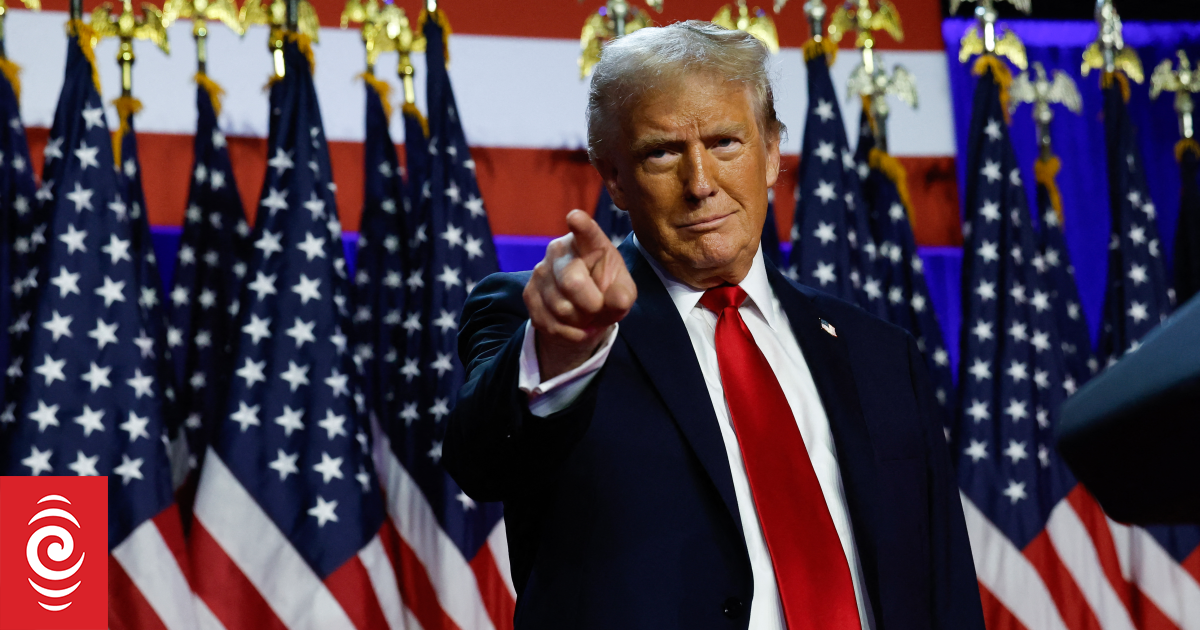
Republican presidential nominee, former US President Donald Trump arrives to speak during an election night event at the Palm Beach Convention Center on 6 November 2024 in West Palm Beach, Florida.
Photo: CHIP SOMODEVILLA / Getty Images via AFP
The evidence, analysis and logic doesn’t matter. President-elect Trump is determined that the world will feel the wrath of his tariffs, even if they will fuel global inflation.
Donald Trump claimed victory in a fair election, voted in by Americans worried about the cost of living and lifted up by his promises to punish countries that are punishing America – by slapping tariffs on the world.
“I guess it’s called democracy,” says trade specialist John Ballingall from Sense Partners, who joins The Detail to talk through the global repercussions of decisions made by the self-described ‘tariff man’.
“The concerning aspect is it’s not just America that his decisions affect.”
Ballingall is in Washington DC meeting his trade and political contacts to try and get the lay of the land, and to work out how this might affect his New Zealand clients.
He fears that while Trump, in his previous term, did enact some trade barriers, this time might be worse as he now has control of both the House and the Senate, giving Republicans total control over Congress and a friendly path for Trump’s priorities.
When it comes to global trade, that is bad news, and New Zealand will inevitably get swept up in the repercussions.
“We’ve just got to keep very close to US government contacts, and I know our embassy is doing that extensively already,” he says.
“But I think there’s quite a lot of nervousness amongst the people I’ve spoken to that it wasn’t great last time, but this time it could be worse. Some of the decision-making could get more and more extreme.”
Ballingall says there is a “fair amount of frantic scrambling” amongst his contacts to try and think about what Trump might do, and how countries might react.
But he agrees with ANZ chief economist Sharon Zollner that the best we can hope for is that our insignificance sees us fly under the radar.
“I think that would be a pretty good outcome. In terms of the proposed trade policy, we are not the target of this. When President Trump talks about wanting to rebalance trade and stop people ripping off the US, he’s not talking about New Zealand. We account for just 0.2 of all of the US’ imports from the world, so we’re not a big player.
“But unfortunately it’s entirely possible that we get caught in the crossfires when the US is taking action against some of the bigger players like China.”
And while we are tiny when it comes to America’s imports, America is now our second biggest export market. It has passed Australia to account for about 13 percent of our goods exports worth around $9 billion in the last 12 months and around a quarter of our services exports worth around $7.4b.
The silver lining for us is that services, such as tourism, accounting platforms and video games, are unlikely to face tariffs.
Our biggest export is beef, much of it going into McDonald’s burgers, which will increase in price for US consumers if those tariffs hit hard.
That is something evident from a run of TikToks and X posts that some Americans clearly do not grasp – the stuff they buy from Walmart and McDonald’s will rise in price, and inflation is the inevitable result of taxing imports.
In the podcast, Ballingall explains that goods will not necessarily rise by the full amount of the tariff, as importers can talk exporters into sharing the cost. But the trickle-down effects of tariffs are also inflationary, and they tend to hit poor people, who buy more goods than rich people, who spend their money on services.
“There’s a lot of uncertainty on how some of the rhetoric that Trump campaigned on might play out,” Ballingall says.
“But I think the direction of travel is clear. He loves tariffs, he’s the ‘tariff man’, self-described.
“We can expect to see tariffs on imports from New Zealand and all other countries. Quite at what level it’s not clear, but what is clear is that it’s about to get more difficult to do business with the US.
“Some countries, or individual companies, may be exempt, but that’s uncertain. “And the uncertainty itself is problematic, because it soaks up a lot of resources for New Zealand exporters trying to work out what on earth is going on,” he says.
Ballingall acknowledges that not everything Trump says, he does, but “he is, and always has been, very strong about tariffs.
“He thinks that they are paid by foreign countries, not by importers into the US; he thinks that they’ll raise a lot of money that he can then use to fund tax cuts for example; and he fundamentally believes that the US needs to punish countries that he believes have been ripping off the US for a long time.”
Ballingall says his understanding is that many economists have tried to take Trump aside to explain how tariffs work, and many have failed.
“He simply doesn’t want to know.”
Check out how to listen to and follow The Detail here.
You can also stay up-to-date by liking us on Facebook or following us on X.

